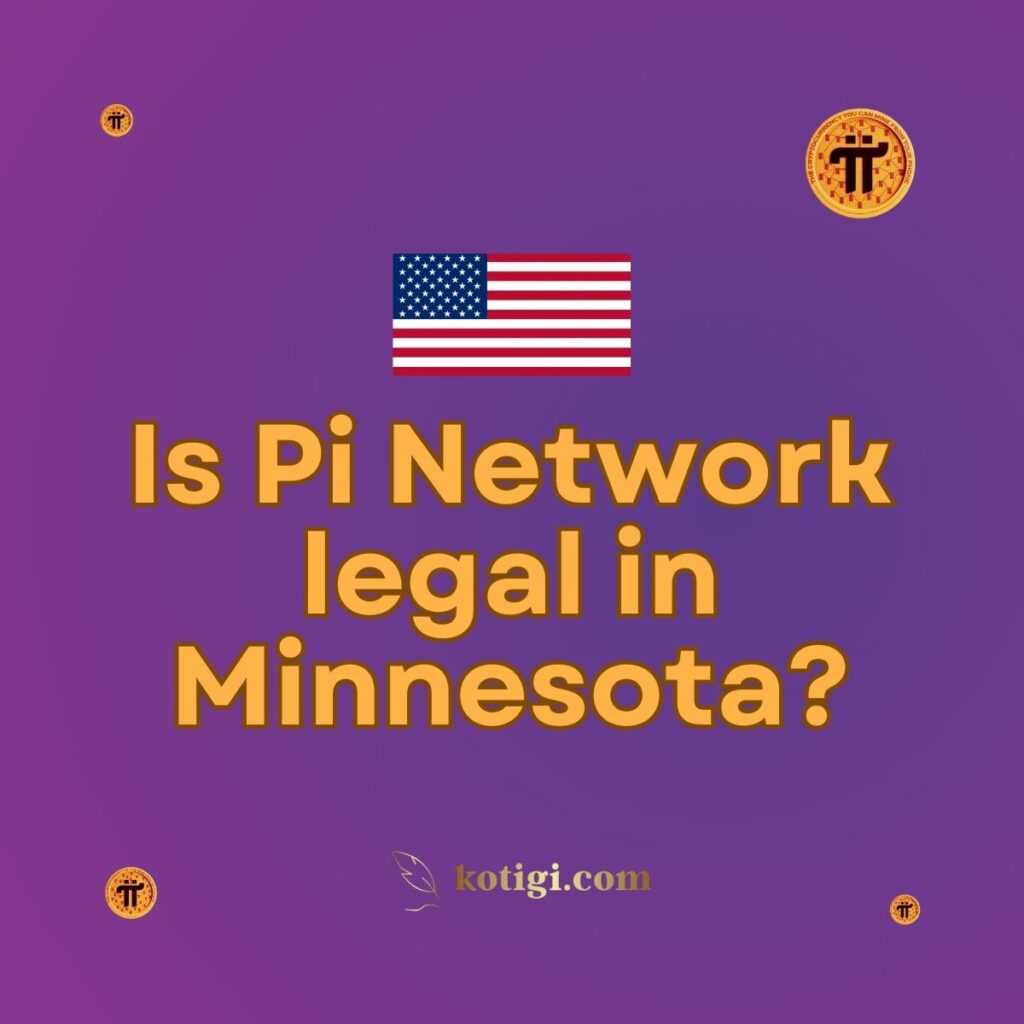
Is Pi Network legal in Minnesota?
Yes, Pi Network is legal in Minnesota, as there are no specific state laws prohibiting its use. However, Pi Network users must adhere to U.S. federal regulations on cryptocurrency, including taxation, anti-money laundering (AML), and know-your-customer (KYC) policies.
Introduction
The cryptocurrency landscape is evolving rapidly, and new networks such as Pi Network are garnering widespread attention. Pi Network, a decentralized cryptocurrency that can be mined using mobile devices, is particularly appealing due to its accessibility. However, as with any cryptocurrency, legal concerns are bound to arise. This is especially true for users in different regions, including Minnesota, where cryptocurrency laws can sometimes be difficult to interpret.
In this blog post, we will examine the legal status of Pi Network in Minnesota, exploring how state and federal regulations apply, what users need to be aware of, and how Pi fits into the broader U.S. cryptocurrency framework.
Understanding Pi Network’s Legal Framework in Minnesota
Pi Network operates in a space that is governed by both federal and state laws, though no specific regulations in Minnesota directly target Pi Network or other cryptocurrencies. Instead, Pi Network users in the state must follow general financial regulations, such as those related to money transmission, taxation, and securities.
Federal Regulations on Cryptocurrencies
In the U.S., federal law plays a central role in regulating cryptocurrencies, including Pi Network. This regulation is essential for ensuring that cryptocurrencies are used lawfully, particularly concerning taxation, AML policies, and KYC compliance.
State-Specific Cryptocurrency Laws in Minnesota
While Minnesota does not have laws explicitly regulating Pi Network or cryptocurrencies in general, users should be aware that the state’s existing laws on money transmission and securities may come into play, especially for those looking to exchange Pi for fiat currencies.
Pi Network and Federal Cryptocurrency Regulations
Federal laws have a significant impact on how Pi Network is used and regulated in Minnesota. As Pi Network operates on a decentralized platform, it must comply with the general legal framework established by the U.S. government for cryptocurrencies.
Taxation of Pi Coins by the IRS
In the U.S., the IRS treats cryptocurrency as taxable property. This means that residents of Minnesota who earn, exchange, or spend Pi coins may need to report them on their tax returns, just like any other property or investment.
- Capital Gains Tax: If users sell or exchange Pi for another cryptocurrency or fiat currency, any profit may be subject to capital gains tax.
- Mining Taxation: The act of mining Pi may not immediately incur taxes, but once Pi is spent or exchanged, taxes could apply.
Anti-Money Laundering (AML) Regulations
The U.S. federal government has stringent AML laws in place to prevent illegal activities, and cryptocurrency is no exception. Platforms that facilitate the exchange of cryptocurrencies must comply with AML requirements. Pi Network itself is decentralized, but any third-party exchanges or platforms dealing with Pi will be subject to these rules.
Know-Your-Customer (KYC) Requirements
Pi Network mandates that users complete a KYC process before they can migrate their mined Pi coins to the mainnet. This is in line with federal regulations aimed at preventing fraud, money laundering, and other illicit activities.
Money Transmission Laws in Minnesota and Their Impact on Pi Network
Minnesota, like other U.S. states, has regulations in place for money transmission, though these are not specific to cryptocurrencies. However, certain activities involving Pi Network could potentially trigger money transmission laws, depending on how Pi is exchanged or used.
What Are Money Transmission Laws?
Money transmission laws regulate the transfer of money or value, ensuring that businesses engaged in these activities are properly licensed. In some states, including Minnesota, these laws can apply to certain cryptocurrency transactions if they involve exchanging cryptocurrency for fiat currency or other assets.
How Pi Network May Be Affected?
Pi Network itself is not classified as a money transmitter, as it operates as a decentralized platform for mining cryptocurrency. However, if Minnesota residents wish to exchange their Pi coins for U.S. dollars or other cryptocurrencies, they may need to do so through a licensed money transmitter or platform.
Personal Use vs. Business Use
For individual users who are simply mining Pi on their mobile devices and storing it for personal use, Minnesota’s money transmission laws are unlikely to apply. However, businesses or individuals who wish to engage in larger-scale exchanges or accept Pi as payment may need to consider the legal implications.
Securities Laws in Minnesota and Pi Network
Securities laws are another area of regulation that could potentially affect cryptocurrencies like Pi. Whether Pi coins are classified as securities can have a significant impact on how they are regulated.
The Howey Test and Cryptocurrencies
In the U.S., the Howey Test is used to determine whether a financial instrument qualifies as a security. For Pi Network, this test would evaluate whether Pi coins are sold as an investment, with the expectation of profit derived from the efforts of others.
Is Pi Network Considered a Security in Minnesota?
As of now, Pi Network coins are not considered securities in Minnesota or the U.S. This is primarily because Pi coins are not purchased as an investment; instead, they are mined through participation in the network. However, if Pi Network evolves in the future to include other financial structures or offerings, securities laws could come into play.
Legal Use of Pi Network in Minnesota
Minnesota residents can legally use Pi Network without concern, provided they comply with general state and federal laws. Mining Pi coins and holding them in a Pi wallet is not restricted, but users must be aware of the legal requirements when exchanging Pi coins or using them for other purposes.
Personal Use of Pi Network
For individual users in Minnesota, mining and holding Pi is perfectly legal. The platform’s accessibility via mobile devices makes it an attractive option for those new to cryptocurrency, and there are no laws prohibiting this activity.
Business Use of Pi Network
Businesses in Minnesota may face additional considerations if they choose to accept Pi coins as payment. While this is legal, it may require additional compliance with state money transmission laws and federal tax regulations.
Pi Network and Taxation in Minnesota
As mentioned earlier, Pi Network coins are considered taxable property under federal law, and Minnesota residents must follow the IRS’s guidelines on cryptocurrency taxation. This includes reporting any gains or losses from the sale or exchange of Pi coins.
Taxable Events for Pi Network Users
Certain activities involving Pi Network can trigger tax obligations for Minnesota residents, including:
- Selling Pi for U.S. Dollars: Any profit made from selling Pi will be subject to capital gains tax.
- Exchanging Pi for Other Cryptocurrencies: Exchanging Pi for other cryptocurrencies may also be a taxable event.
- Using Pi for Goods or Services: If Pi coins are used to purchase goods or services, this could be considered a taxable transaction.
Non-Taxable Events
Mining Pi coins in and of itself is generally not a taxable event until the coins are used in a transaction. This means that Minnesota users can mine Pi on their mobile devices without worrying about immediate tax implications.
Federal Oversight and the Future of Pi Network in Minnesota
The legal landscape for cryptocurrencies is continually evolving, and this applies to Pi Network as well. While Pi Network is currently legal and compliant with U.S. federal laws, there is always the possibility that future regulatory changes could impact its legal status in Minnesota.
Potential Changes in Cryptocurrency Regulation
As cryptocurrencies gain more mainstream adoption, U.S. lawmakers may introduce more specific regulations targeting decentralized networks like Pi. While this could bring greater clarity, it may also impose additional compliance requirements for users and businesses.
Ensuring Compliance with U.S. Law
Pi Network users in Minnesota should stay informed about changes in both federal and state cryptocurrency regulations. By doing so, they can ensure that they continue to use Pi Network legally and responsibly.
Conclusion
In conclusion, Pi Network is legal in Minnesota, and users can mine and hold Pi coins without issue. However, as with any cryptocurrency, users must comply with U.S. federal regulations, including those related to taxation, AML, and KYC. While Minnesota does not have any state-specific laws directly targeting Pi Network or cryptocurrencies, certain activities, such as exchanging Pi for fiat currency, may trigger existing financial regulations, such as the state’s money transmission laws. As cryptocurrency regulations continue to evolve, Pi Network users in Minnesota should stay informed to ensure they remain compliant with the law.
Key Takeaways
- Pi Network is legal in Minnesota, with no state laws specifically prohibiting its use.
- Federal laws apply to Pi Network users, particularly regarding taxation, AML, and KYC requirements.
- Minnesota’s money transmission laws may apply if Pi coins are exchanged for fiat currency.
- Pi coins are not currently classified as securities under U.S. law.
- Mining and holding Pi coins are legal activities for personal use, but users must report any taxable events.
- Businesses accepting Pi coins may need to comply with additional regulations related to money transmission and taxation.





